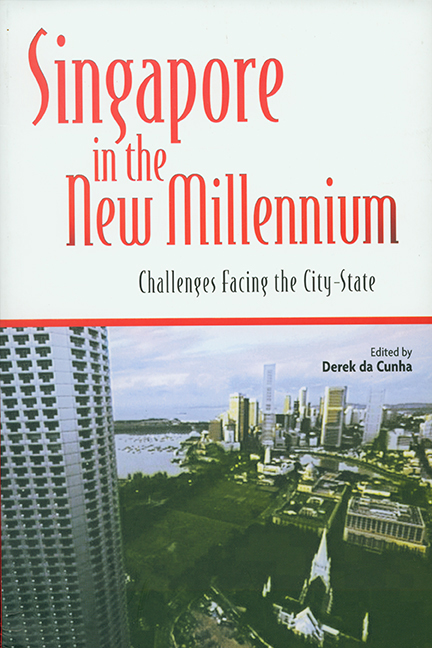Book contents
- Frontmatter
- Contents
- Preface
- Contributors
- 1 The Limits of a City-state: Or Are There?
- 2 External Challenges Facing the Economy
- 3 Governance: Its Complexity and Evolution
- 4 The Future of Civil Society: What Next?
- 5 Relating to the World: Images, Metaphors, and Analogies
- 6 Relating to the World: Images, Metaphors, and Analogies
- 7 Education in the Early 21st Century: Challenges and Dilemmas
- 8 Reframing Modernity: The Challenge of Remaking Singapore
- 9 National Identity, the Arts, and the Global City
- 10 The Media and the Flow of Information
- 11 Conclusion
- Index
4 - The Future of Civil Society: What Next?
Published online by Cambridge University Press: 21 October 2015
- Frontmatter
- Contents
- Preface
- Contributors
- 1 The Limits of a City-state: Or Are There?
- 2 External Challenges Facing the Economy
- 3 Governance: Its Complexity and Evolution
- 4 The Future of Civil Society: What Next?
- 5 Relating to the World: Images, Metaphors, and Analogies
- 6 Relating to the World: Images, Metaphors, and Analogies
- 7 Education in the Early 21st Century: Challenges and Dilemmas
- 8 Reframing Modernity: The Challenge of Remaking Singapore
- 9 National Identity, the Arts, and the Global City
- 10 The Media and the Flow of Information
- 11 Conclusion
- Index
Summary
Civil society groups are okay for committee meetings and issuing statements and press conferences.
Senior Minister Lee Kuan Yew, Straits Times, 11 August 1999There is a problem in thinking about the future of politics and civil society. This is so both generally in much of the world, and specifically in Singapore. Intellectual thought in the late twentieth century has lost the polarity that characterized the decades after World War II, between democracy and capitalism on the one hand, and socialism and totalitarian systems on the other. The end of the Cold War has not been the end of history, as Francis Fukuyama suggested in his End of History and the Last Man. But the neoliberal programme of democracy and free markets has become the dominant set of arrangements in most thinking about politics.
The dominance of the idea of democracy and free markets has been resisted by some, not only in Asia but also in the United States and Europe, among both conservatives and progressives. There has been talk of a “third way”, both in Europe and the United States. Some, such as Etzioni, Sandel, and Putnam, have also suggested the need for communitarian democracies. Much of this, however, seems a rearguard defence of socialist democracy, and a nostalgia for community. Thinking about political futures has, in this context, fallen prey to new forms of determinism and fatalism. This is especially the case in most political predictions about Asia's future.
In the late 1980s and after, some suggested that the new rich in Asia would necessarily bring democracy. South Korea and Taiwan were seen as examples of this trend, moving away from “soft authoritarianism” to true democracy. There were some who predicted the same would inevitably come to pass in Singapore and other countries that resisted this trend. This set the context for the “Asian values” debate that seemed, in the mouths of some, to argue for essentialized differences in perpetuity.
- Type
- Chapter
- Information
- Singapore in the New MillenniumChallenges Facing the City-State, pp. 69 - 107Publisher: ISEAS–Yusof Ishak InstitutePrint publication year: 2002

